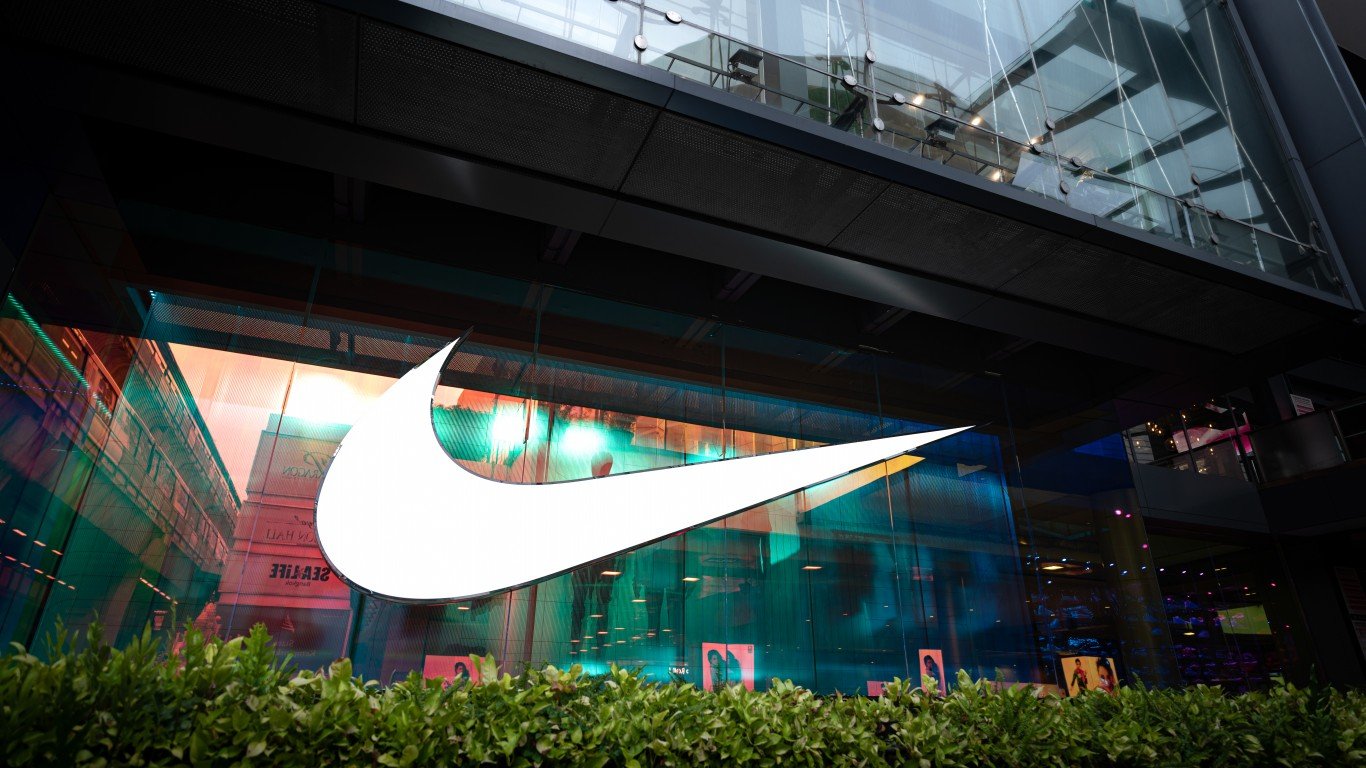

It is undeniable that what likely will be 20% or worse unemployment and a drop of more than 20% in gross domestic product is a very bad recession. It’s also undeniable that many businesses have been crushed, many sectors of the economy have been damaged and millions of workers have been harmed. Despite all the economic carnage, many companies are thriving in this economy. Many other companies want their share of the new economy as well.
24/7 Wall St. has been tracking the economic and corporate changes in great detail, as well as all the trends around the COVID-19 impact on the community and the economy. Many defensive stocks did not live up to being defensive, but the new economy has been absolutely dominated by just 40 companies, while the rest of the business world was either closed to tried to muddle on.
While Amazon.com Inc. (NASDAQ: AMZN) has been growing and then taking over certain aspects of the U.S. economy, Shopify Inc. (NYSE: SHOP) has been growing exponentially and taking its share of the e-commerce pie. These companies have similar approaches on part of their business efforts, but Shopify is more of a platform and partner for merchants. Even as Shopify is adding the equivalent of a banking back-end for its merchants, Facebook Inc. (NASDAQ: FB) wants its slice of the action as well.
The bad news for these businesses is that it will be a more competitive landscape ahead. The good news is that these business efforts to win the hearts and minds of business owners to come under their platform still has massive and untapped growth potential in what has been a highly fragmented market for merchants.
Facebook should have been included in the companies thriving in the recession, but at the time we were evaluating the companies its stock had not recaptured its losses. Facebook also was busy communicating how its advertising revenues were being hit hard as advertisers were pulling back. The social media platform is already a portal of sorts for many sole proprietors and small businesses alike, but now the Facebook Shops effort will be unified with Facebook and Instagram with more advanced e-commerce solutions.
What happened in the past two weeks is that Facebook’s new “shops” effort has helped the stock hit a new all-time high above $230. The stock even hit its consensus analyst price target from Refinitiv of $237.38, as analysts have been raising their projections again. Deutsche Bank issued a new report signaling that the year-ago estimate of Instagram Checkout having a potential $10 billion value could now be a $30 billion revenue opportunity.
As for Amazon, it has been winning all around in the new economy. On top of the endless packages delivered to almost every home in America, Amazon’s data center growth from Amazon Web Services (AWS) has allowed it not to even care about the old-world brick-and-mortar stores it competes against, as they are either still closed or gradually reopening with the phased reopening of the U.S. economy.
Amazon may have had bad public relations issues from warehouse workers, but the reality is that its business is booming. The company hired 100,000 or more people for new jobs to deal with demand, and investors seem to have zero cares that Amazon’s expenses are way up and that it was effectively targeting for all of its profits to be plowed back into the business and to workers in the second quarter of 2020.
Amazon shares recently peaked just above $2,500 for the first time ever, and Refinitiv’s consensus target price has climbed up to almost $2,650, as the Jeff Bezos euphoria has grown and grown.
Shopify should not be a defensive company at all on the surface, due to a valuation that is nearly impossible to justify. The company even warned about business trends and a lack of visibility during the peak of the panic back in March. With a $97 billion market cap and a stock price that is now above $800, Shopify is somehow valued at close to 1,600 times expected 2021 earnings and valued at more than 35 times expected 2021 revenues. That doesn’t sound defensive at all, at least not until everyone’s small and midsized business had no choice but to digitize and either go online or allow for virtual operations. That puts Shopify into the essential business category, and then some.
While Shopify has taken the e-commerce and back office for website management to the next level, the company is going a step further in helping with all aspects of the behind-the-scenes on websites, allowing for transactions in multiple currencies across multiple geographies, and even in fulfillment centers. The market did not even punish Shopify when it raised an opportunistic $1.5 billion after a big rise in its stock price to boost its finances. Shopify has seen its stock go above and beyond its consensus stock price from analysts, and then its shares have continued to rise even further.
The most recent driver for Shopify has been what came from its Reunite virtual event that included Shopify Balance and Shop Pay Installments for merchants. The company noted that many of its small business merchants had seen trends in which business owners were using their personal accounts to assist their businesses during these hard times. So by effectively creating its own banking efforts and helping merchants generate new revenue at checkout and creating delivery options, the company is effectively trying to help future-proof its customers.
It is now arguable whether there is still a bear market in stocks. Despite the major indexes still being down for the year, every major equity index recaptured more than half of the sharp losses that were seen from mid-February through March 23. Just don’t bother telling these three online giants about how the economy is awful and how the stock market became too risky. Amazon shares are up over 30% year to date, and Shopify is up 100% in that time. Facebook is only up 12%, but that is still handily better than the 8% year-to-date loss for the S&P 500.
As with all great gainers, there is always the need to keep valuations and gravity in mind. The economic stimulus has been unprecedented at a time when most Americans have been very concerned about staying healthy and out of harm’s way.
Trying to put valuations into this mix is a very difficult process for even the most aggressive and astute investors. What is not difficult to see is that these three companies are all still pursuing growth opportunities that are well beyond what most companies are hoping for ahead.
Sponsored: Find a Qualified Financial Advisor
Finding a qualified financial advisor doesn’t have to be hard. SmartAsset’s free tool matches you with up to 3 fiduciary financial advisors in your area in 5 minutes. Each advisor has been vetted by SmartAsset and is held to a fiduciary standard to act in your best interests. If you’re ready to be matched with local advisors that can help you achieve your financial goals, get started now.
Thank you for reading! Have some feedback for us?
Contact the 24/7 Wall St. editorial team.



